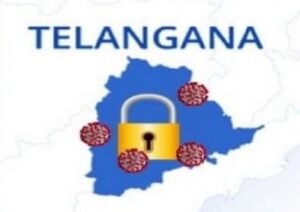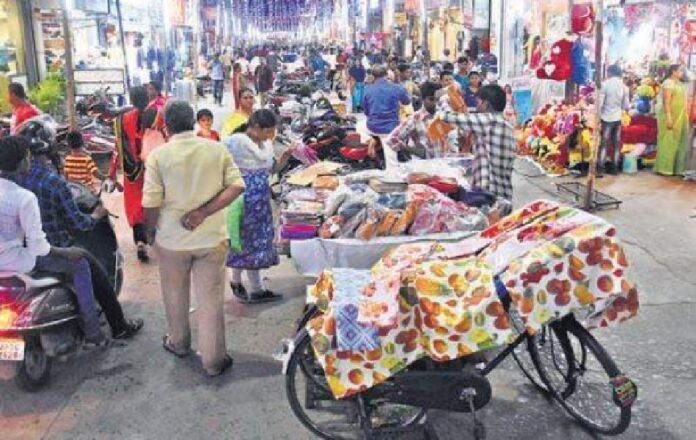Although the Central government announced monetary relief to street vendors under the SVANidhi scheme last year to mitigate financial hardship, the complex application process has left many vendors high and dry.
Pravin Kumar, a street vendor, sells cold drinks near the famous Charminar in Hyderabad old city. He has been without work since late March 2020 and was only able to resume vending in January 2021, nine months after the lockdown was imposed.
 Even now, he is only able to work for two hours a day. With barely any tourists coming through and a persisting fear of infection from street food and drink, his earnings are negligible compared to pre-lockdown levels. He bemoans the continued lack of earnings even today, “Some days, I don’t even want to go to work because I make so much effort and earn barely any money. I can only vend for two hours and no one wants to drink cold drinks in this weather right now. It doesn’t seem to be worth it.”
Even now, he is only able to work for two hours a day. With barely any tourists coming through and a persisting fear of infection from street food and drink, his earnings are negligible compared to pre-lockdown levels. He bemoans the continued lack of earnings even today, “Some days, I don’t even want to go to work because I make so much effort and earn barely any money. I can only vend for two hours and no one wants to drink cold drinks in this weather right now. It doesn’t seem to be worth it.”
Kumar is one of many street vendors attempting to earn a livelihood on the streets of Hyderabad. The Period Force Labour Survey (PLFS) data from 2017-18 shows that street vendors account for 4.2% of total urban employment in India and 3.5% of employment in Hyderabad and Secunderabad. Other estimates say that there are close to 3,00,000 street vendors in Hyderabad, yet the Greater Municipal Corporation of Hyderabad (GHMC) officially counts about 1,25,000 “legal” vendors (as per last vendor rolls).
Vending is often stigmatised as being anti-developmental and anti-social; street vendors contribute in many positive ways to city life. Street vending is not only a source of self-employment to the poor in cities and towns but also a means to provide ‘affordable’ as well as ‘convenient’ services to a majority of the urban population.
 Street vending is also a crucial part of larger supply chains and creates demand for other goods and services. Many of the goods sold by street vendors, such as clothes and hosiery, leather and moulded plastic goods and household goods, are manufactured in small-scale or home-based industries, which in turn generate employment for other urban workers.
Street vending is also a crucial part of larger supply chains and creates demand for other goods and services. Many of the goods sold by street vendors, such as clothes and hosiery, leather and moulded plastic goods and household goods, are manufactured in small-scale or home-based industries, which in turn generate employment for other urban workers.
In March 2020, when the country went into lockdown, it had a harsh and immediate effect on street vendors, as it did for many other workers in the city’s massive informal economy. An empty city meant that the city’s vendors immediately lost their source of income and were confronted with hunger and deprivation.
A study conducted by Women in Informal Employment: Globalizing and Organizing (WIEGO) on the impact of COVID-19 shows that in the initial months of lockdown roughly 90% cent of vendors lost work, and even when the lockdown was lifted, recovery was slow, and it has not come back to pre-lockdown times. Due to the lack of work and earnings, most vendors used saved capital to feed themselves and their families. In this context, restarting livelihood has become even more difficult.
 Street vendors have also faced harsh effects from increased e-commerce. A recent report reveals that the e-commerce market grew 73% in 2020 from the preceding year, with many moving to online purchasing keeping social distancing in mind. The strongest shift from offline to online buying has been fruits and vegetables, one of the most ubiquitous sources of livelihood for vendors.
Street vendors have also faced harsh effects from increased e-commerce. A recent report reveals that the e-commerce market grew 73% in 2020 from the preceding year, with many moving to online purchasing keeping social distancing in mind. The strongest shift from offline to online buying has been fruits and vegetables, one of the most ubiquitous sources of livelihood for vendors.
In May 2020, the Central government announced a special credit facility of Rs 5,000 crore for street vendors, as part of the Atma Nirbhar Bharat Abhiyan. Under the SVANidhi scheme, a vendor is eligible for up to Rs 10,000 as initial working capital. This scheme had initially targeted ‘legal’ vendors keeping many out of its ambit. While the scheme has since relaxed requirements for proof of occupation, this drives home the essential need for providing vendors with a legal identity of their occupation.
While ambitious and touted widely as a landmark COVID relief scheme, the scheme has not been without its problems. Many vendors report issues in accessing loans, from the complicated application process for vendors not recognised as ‘legal’; to slowdowns in processing the loans.
For example, Pravin Kumar has been waiting for his loan amount to be released for nearly three months. Bank officers only tell him that the loan is still being processed. Other vendors who need a letter of recommendation from the municipal body say that municipal bodies are not approving applications for the loan.
 While street vendors are in the process of slowly recovering from this crisis, it is critical to take action to remove the barriers that are leading to their continued precarity and vulnerability, even as the sector is governed under progressive legislation.
While street vendors are in the process of slowly recovering from this crisis, it is critical to take action to remove the barriers that are leading to their continued precarity and vulnerability, even as the sector is governed under progressive legislation.
The Street Vendors (Protection of Livelihood and Regulation of Street Vending) Act, 2014 recognises that around 3.5% of a city’s population are street vendors and that they should be accommodated in vending zones in accordance with this norm. Even six years after being passed into law, the Act is yet to be fully implemented in Hyderabad. Given that this is a uniquely progressive law in its recognition of informal workers and in giving vendors a seat at the governing table, its slow implementation has further exacerbated the current perils faced by the street vendors of Hyderabad and Secunderabad.
Street vendors are often seen as illegal occupants of public space. Historically, street vendors have not been a part of the city’s planning processes and they have to negotiate for identity (licenses), access to public space (for vending, transportation) and to defend against evictions from ‘natural’ market zones, almost on a daily basis. They are frequently targeted, harassed and evicted by government officials. Between January 2017 and September 2018 alone, vendor petitioners challenged evictions 22 times, of which the high court of Telangana ruled against vendors in 14 cases.
 The Telangana government has finally started the process of survey and registration under the Act. Registration and recognition as ‘legal’ vendors will help ensure that all are able to access social security benefits and financial aid during this period of crisis. The effective implementation of the law in letter and spirit will go far in making this a reality.
The Telangana government has finally started the process of survey and registration under the Act. Registration and recognition as ‘legal’ vendors will help ensure that all are able to access social security benefits and financial aid during this period of crisis. The effective implementation of the law in letter and spirit will go far in making this a reality.
Nearly a year on from the lockdown, the overwhelming demand from street vendors is still for support to resume working. Easier and faster access to capital and permission to work without harassment is essential to aid recovery for vendors.
For so many vendors, businesses have fallen due to a perceived fear among people that the disease will spread more easily in markets. It is time to think of innovative market redesign to enable safe and socially distant vending.
As we move into the next phase of the COVID-19 crisis, dealing with this new normal can be an opportunity for truly transformative change. Vendors have continued working and surviving despite many difficulties and challenges, but they need support. The need of the hour is recognition for them under the Street Vendor Act and more efficient access to financial aid for faster recovery. #KhabarLive #hydnews







